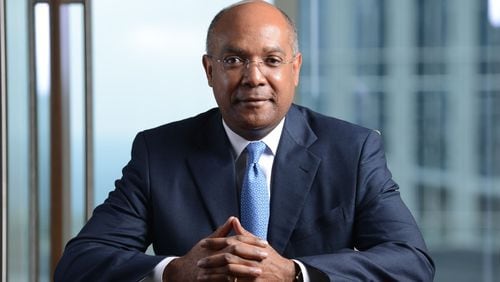Digging deep
Since July, The Atlanta Journal-Constitution has been reporting on Atlanta investment adviser Larry Gray, whose firm, Gray & Company, recommends investments for public pension systems and now is under investigation by the U.S. Securities and Exchange Commission.
The AJC’s first story detailed how some trustees with the Atlanta General Employees’ Pension Plan believed Gray hadn’t made clear his firm’s financial interest when he sought an investment from the board in a fund his firm had just created. One of the system’s trustees, Angela Green, complained to the SEC.
Then the AJC revealed how, at the time Gray was pitching his fund, he was paying off $425,000 in federal tax liens and a $1 million settlement of a lawsuit accusing his company of fraud. Neither fact was included in disclosures Gray filed with government regulators, although investment advisers in most circumstances must report such matters.
Gray, citing media coverage of his roles as both a pension investment adviser and investment fund manager, resigned from his consulting positions with the General Employees board as well as the Atlanta police and fire pension systems late last year. However, he still manages those boards’ investments in his fund.
The U.S. Securities and Exchange Commission investigation of Atlanta pension adviser Larry Gray has widened to include his work with retirement systems in at least two other states and whether he properly disclosed loans from companies closely aligned with a pension investment, The Atlanta Journal-Constitution has learned.
Interviews and documents obtained by the AJC reveal that the SEC has been investigating Gray's consulting work with public pensions in Connecticut and Michigan in addition to the Atlanta General Employees' Pension Plan, the original focus of the probe.
The SEC has looked into whether Gray’s firm, Gray & Company, received loans from two companies in which the New Haven, Conn., police and fire pension invested and whether those loans were disclosed to the board. It also has scrutinized how Gray portrayed his own investment fund to the employee retirement board in Pontiac, Mich., a scenario that mirrors the circumstances that prompted the investigation in Atlanta.
Gray did not respond to AJC requests for an interview. He resigned as the pension investment adviser in New Haven in November but remains in that role in Pontiac.
An SEC spokesman declined comment, saying the agency cannot confirm or deny the existence of an ongoing investigation.
Typically, if the SEC expands an investigation, it’s because the agency has developed information from witnesses or documents and not because it’s on a “fishing trip,” said Tom Sporkin, a Washington D.C. attorney who previously spent 20 years working in the SEC’s enforcement division.
“It’s where the evidence leads,” he said.
The New Haven portion of the investigation raises fresh and potentially significant questions for Gray and his Buckhead-based firm, which was paid roughly $145,000 a year to manage that retirement system’s $290 million portfolio.
Pension consultants are expected to provide objective advice, and any form of compensation from a company with business before the pension board, including loans, must be disclosed, experts in securities law said. Secret deals between public pension advisers and investment fund managers have drawn scrutiny in recent years from both the SEC and law enforcement agencies, concerned about what’s known as “pay to play.”
“It is a conflict of interests that should be disclosed because (the pension adviser) is in the role of monitoring and evaluating investments,” said Ted Siedle, a former SEC attorney who now conducts forensic investigations.
Link to ex-Falcon’s firm
The issue in New Haven has been Gray & Company’s relationship with Capital Point Partners, a Houston-based private equity firm headed by Alfred Jackson, a former Falcons player from the 1970s and ’80s who has become a politically-connected and at times controversial figure in the pension investment world.
The New Haven board has twice invested in funds managed by Capital Point, committing a total of $8 million.
According to the board's chairman, James Kottage, Gray & Company obtained lines of credit from Capital Point and another Texas firm, Walton Financial LLC, but both loans were disclosed.
“We understood this to be in line with the normal business activities of these firms and the lines of credit were fully disclosed prior to inception,” Kottage wrote in an undated letter that was addressed to the Atlanta office of the SEC but never mailed. The letter was obtained by the AJC from the board in response to a public records request.
However, at a board meeting last November when the SEC’s investigation of Gray was discussed, the two trustees who mentioned the loan indicated that it had not been disclosed to them.
“The loan, however that was structured, we never knew about that,” board member Frank Lombardi said, according to an audio recording of the meeting.
Kottage and other New Haven board members did not respond to interview requests. Carolyn Kone, the board’s legal counsel, said Kottage’s letter, though never sent to the SEC, was provided to the agency in response to a subpoena. She declined to discuss the matter further.
A review of public records by the AJC shows that a financing statement was filed in Fulton County in December 2012 for a loan to Gray & Company from Walton Financial. The company was incorporated six months earlier in Texas by Nate Paul, a 27-year-old Austin entrepreneur.
Paul's holdings include GreatValue Storage, a company in which the second of Jackson's two Capital Point funds has invested more than $5 million, records show.
In biographical material Paul submitted to an Austin business group prior to a 2010 speaking engagement, he stated that he served as a managing partner of The Inroads Group, a firm founded by Jackson and the parent company of Capital Point Partners.
The timing of the financing statement indicates that the Walton Financial loan to Gray & Company was made just months after Gray agreed to pay $1 million to settle a lawsuit accusing him of fraud in managing the financial affairs of college basketball coach Perry Clark. At the time, Gray was also paying off $425,000 in federal tax liens.
Neither Paul nor Jackson responded to phone and email interview requests from the AJC.
`Pay to play’ in New Mexico
Jackson, 58, is among the defendants in a civil suit filed by the New Mexico State Investment Council alleging a wide-ranging "pay to play" scheme. The suit alleges that between 2003 and 2009 Jackson and others used their connections to then-Gov. Bill Richardson to obtain kickbacks disguised as marketing fees from companies seeking to invest the state's oil and gas tax revenue.
The scheme was facilitated by the council's investment adviser, Saul Meyer, with whom Jackson had a close relationship, the lawsuit alleges. Jackson helped Meyer's firm, Dallas-based Aldus Equity Partners, land the lucrative consulting position, and, in return, Meyer recommended investments that would benefit the ex-NFL player, the suit claims.
Jackson’s role in the scandal became an issue for Capital Point in the spring of 2012 when it wanted to extend the time in which it could solicit investors for its second fund. The $28 million raised by the firm was far short of the $250 million it had projected.
The largest investor, the Shelby County, Tenn., government retirement system, wanted Capital Point removed as the general partner, in large measure because of the lawsuit in New Mexico and the allegations concerning Jackson.
“In conjunction with New Mexico, the investment community obviously wasn’t comfortable,” said Mike Swift, the county’s director of administration and finance.
After several months of negotiation, Capital Point was allowed to remain as general partner but with reduced fees and a shorter life for the fund. The new partnership agreement, finalized in January 2013, did not list Jackson as the managing director.
Informing the New Haven trustees of Capital Point's request and Shelby County's reservations in July 2012, Gray noted that there had been "discord" among Capital Point's managers, but he made no mention of the lawsuit or Jackson's troubles.
"He's a really great marketing guy," Gray said, describing Jackson for the board. "In fact, part of his problem is he's a really great marketing guy. … My advice to him, which he did ask (for) in front of his team, (was) I don't think he should try to run a company. … It would be great if he hired a person to run everything and go back to doing what he does best."
Gray pointed out to the trustees that, even without Capital Point as general partner, the board would still be investors in Great Value Storage and two other companies, a position he did not see as worrisome.
“I don’t want to speak prematurely, but you have three companies here that, at least according to the financials we’ve been able to see thus far, are in fine working condition,” he said, adding that he was “looking forward to meeting the principals because I hear they are really solid business people.”
A reference to Obama
In Pontiac, the SEC has sought to know whether Gray actually made several comments attributed to him in the board's minutes. However, because the meetings aren't taped, determining the accuracy of the minutes could prove problematic.
The minutes for one meeting quote Gray as telling the board that one of the managers he’d met with had told President Obama “no” when he wanted to invest.
The minutes for another show Gray responding to a question about a possible conflict of interests by saying, "The City of Atlanta did not have a problem with this arrangement," although the meeting occurred at a time _ December 2011 _ when he had not officially pitched his fund to Atlanta's pensions. At the end of that discussion, the Pontiac board voted to invest $6 million in the fund, Grayco Alternative Partners I.
The SEC began investigating Gray last year after a member of the Atlanta General Employees board, Angela Green, complained that Gray hadn’t adequately disclosed his role when he sought an investment from the board in his second fund, Grayco Alternative Partners II.
A forensic audit commissioned by the board and performed by an Atlanta firm, GlassRatner, recently concluded that Gray & Company did in fact disclose its role as fund manager and general partner.
Gray, citing media coverage of his dual role, resigned his advisory position with the General Employees board as well as the city’s police and fire pension boards last year. However, his company still manages Grayco Alternative Partners II, to which the three Atlanta pensions have committed $64 million.
About the Author







